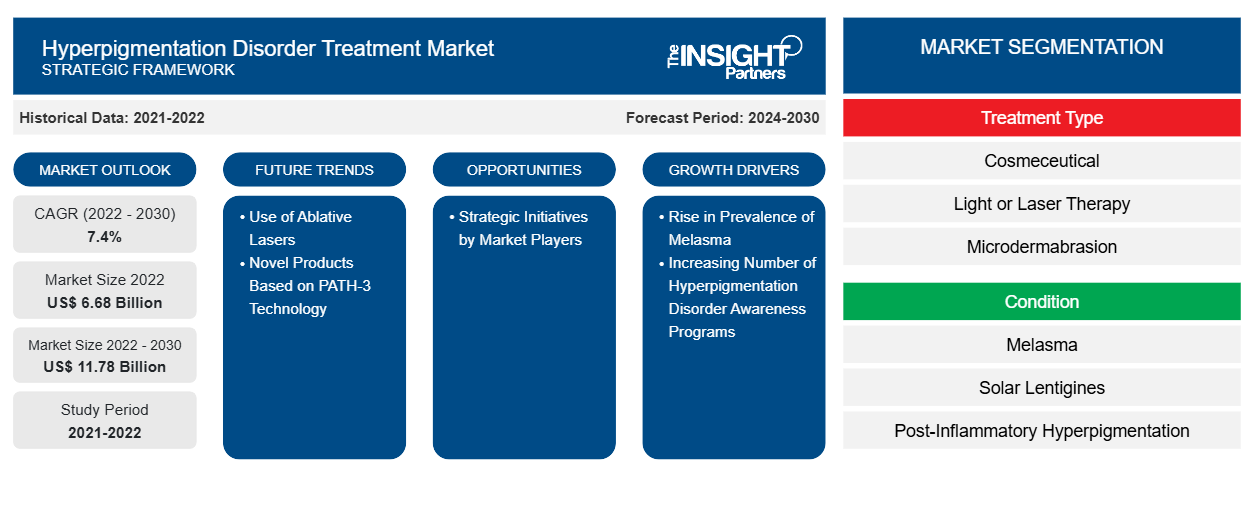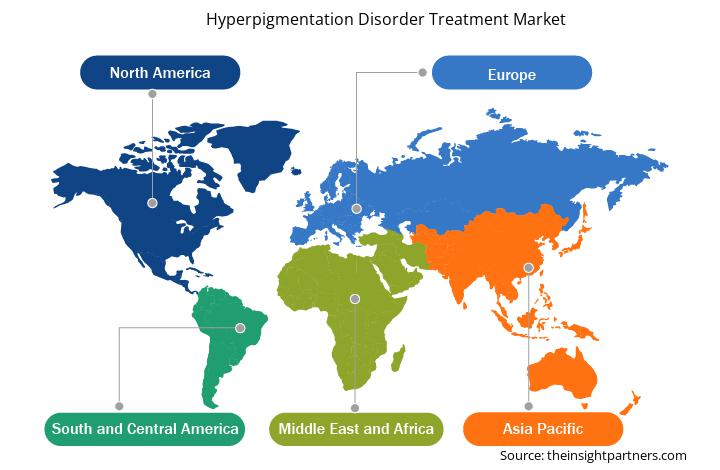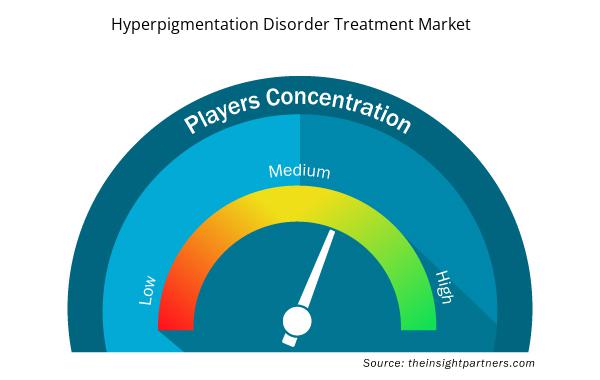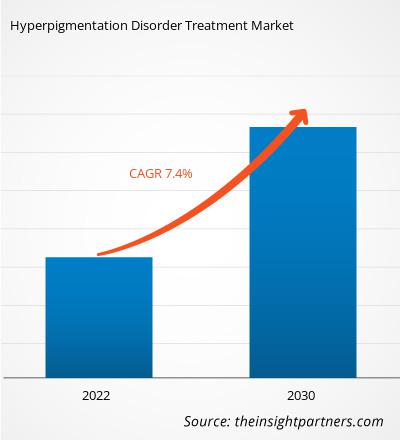The hyperpigmentation disorder treatment market forecast can help stakeholders in this marketplace outline their growth strategies. The market is projected to grow from US$ 6.68 billion in 2022 to US$ 11.78 billion by 2030; it is estimated to record a CAGR of 7.4% during 2022–2030.
Factors such as simplified and minimally invasive procedures, and wide range of applications; and improvements in comfort, efficiency, and outcomes with technological advancements propel the hyperpigmentation disorder treatment market. However, the potential side effects and regulatory challenges hamper the growth of the market. The growing adoption of novel products based on path-3 technology is further expected to bring new trends in the hyperpigmentation disorder treatment market in the coming years.
Growth Drivers:
Increasing Number of Hyperpigmentation Disorder Awareness Programs Drive Market Growth
Campaigns to raise awareness about UV-induced skin hyperpigmentation are essential to educate the general populace on the prevention, screening, diagnosis, and treatment of these conditions; they also discuss the importance of using good-quality sunscreen products to manage these disorders.
- On May 25, 2022, Bella Aurora celebrated the International Skin Pigmentation Day. With over 130 years of experience in skin pigmentation research, Bella Aurora launched an international awareness campaign to celebrate the day with the support of renowned dermatologists, pharmacists, and key opinion leaders across the US, Spain, Italy, and Mexico.
- In June 2021, Dermalogica Clear launched a campaign to encourage skin acceptance and educate audiences on post-inflammatory hyperpigmentation, acne, breakouts, and more.
- Zydus Healthcare, India, executed the nationwide Melasma Awareness Movement, also known as the “Face the World” campaign, from April 1 to May 31, 2023, to enhance awareness about melasma. In August 2023, Zydus Healthcare set a record for maximum health care professionals (HCPs) joining this campaign with the participation of 18,737 HCPs in the campaign, who contributed to making a vast number of patients aware of melasma.
The increased awareness of melasma and other hyperpigmentation disorders has led to a surge in demand for innovative and efficacious treatment products and procedures. Moreover, it has brought about a significant and positive change in how society understands and manages hyperpigmentation. Thus, the increasing number of awareness programs bolsters the hyperpigmentation disorder treatment market growth.
Customize This Report To Suit Your Requirement
You will get customization on any report - free of charge - including parts of this report, or country-level analysis, Excel Data pack, as well as avail great offers and discounts for start-ups & universities
Hyperpigmentation Disorder Treatment Market: Strategic Insights

- Get Top Key Market Trends of this report.This FREE sample will include data analysis, ranging from market trends to estimates and forecasts.
Customize This Report To Suit Your Requirement
You will get customization on any report - free of charge - including parts of this report, or country-level analysis, Excel Data pack, as well as avail great offers and discounts for start-ups & universities
Hyperpigmentation Disorder Treatment Market: Strategic Insights

- Get Top Key Market Trends of this report.This FREE sample will include data analysis, ranging from market trends to estimates and forecasts.
Restraints:
High Cost of Treatments
Cost is an essential factor in elective procedures or treatments. The cost of cosmeceutical, chemical peel, cryotherapy, light or laser therapy, microdermabrasion, and other hyperpigmentation varies depending on the type of technique employed, the time and effort required for the process or therapy, the geographic location of facilities, and the professional expertise of the surgeon carrying out the treatment. Moreover, health insurance does not cover hyperpigmentation treatments. The hyperpigmentation treatment cost is significantly high. For instance, salicylic acid, which is the highest-rated active ingredient, costs nearly US$ 15.00 per ounce. Furthermore, kojic acid has the highest cost among all active ingredients, i.e., US$ 24.89 per ounce), which is much higher than the cost of sunscreen products (US$ 3.32, a median price per ounce). The use of sunscreens is the recommended first-line hyperpigmentation treatment.
As per the pricing details provided by the American Society of Plastic Surgeons, the average costs of several popular types of hyperpigmentation treatment are as follows:
- Microdermabrasion: US$ 2,000
- Skin resurfacing procedures: US$ 1,489
- Microneedling: US$ 300–1,200
- Dermabrasion/resurfacing: US$ 1,250–4,500 (depending on location)
- Skin peels: US$ 125–350
- Laser therapy: US$ 250 or more
- Chemical peel procedures: US$ 519
The abovementioned costs exclude fees such as operating room costs or anesthesia. Moreover, insurance rarely covers cosmetic procedures such as skin peels, skin resurfacing, and laser therapies. Thus, the high cost of hyperpigmentation treatment limits the growth of the hyperpigmentation disorder treatment market.
Trends:
Use of Ablative Lasers
There have been many advancements in laser devices designed to treat hyperpigmentation. Ablative lasers such as Erbium:YAG (Er:YAG) and carbon dioxide (CO2) have been in use to treat acne scars. Nevertheless, side effects led to a decrease in the popularity of this technique. Subsequently, nonablative lasers such as NdYAG lasers and erbium glass gained traction in the treatment of hyperpigmentation. Although this technique has less risk, it is not a reliable one due to the inadequacy of results. With advancements in fractional technology, treating hyperpigmentation with ablative lasers such as CO2 and erbium YAG has regained popularity. Thus, the use of ablative lasers such as CO2 and Er:YAG is expected to bring new hyperpigmentation disorder treatment market trends during the forecast period.
Report Segmentation and Scope:
The Hyperpigmentation disorder treatment market analysis has been carried out by considering the following segments: treatment type, condition, and end user.
By treatment type, the market is segmented into cosmeceutical, light or laser therapy, microdermabrasion, chemical peels, cryotherapy, and others. The cosmeceutical segment held the largest hyperpigmentation disorder treatment market share in 2022. Cosmeceuticals, which harness both cosmetic and pharmaceutical capabilities, have gained significant attention in skincare, particularly in addressing concerns such as hyperpigmentation. Potent active pharmaceutical ingredients are combined with cosmetic formulations to effectively target specific skin issues. For the treatment of hyperpigmentation, the effect of cosmeceuticals goes beyond traditional skincare products to lighten dark spots, even out skin tone, and enhance skin radiance. Ingredients such as vitamin C, niacinamide, kojic acid, and alpha hydroxy acids are commonly found in cosmeceutical formulations designed for hyperpigmentation, offering brightening and pigment-regulating properties. Combining advanced pharmaceutical ingredients into cosmeceutical formulations provides targeted treatment approaches that help address issues associated with melanin production, skin discoloration, and uneven pigmentation, thereby promoting a more balanced and radiant complexion. Further, the microdermabrasion segment is anticipated to register the highest CAGR during the forecast period.
The market, by condition, is categorized into melasma, solar lentigines, post-inflammatory hyperpigmentation, and others. The melasma segment held the largest hyperpigmentation disorder treatment market share in 2022. It is further anticipated to register the highest CAGR during the forecast period.
The market, by end user, is categorized into hospitals, dermatology centers, and others. The hospitals segment held the largest market share in 2022. Further, the dermatology centers segment is anticipated to register the highest CAGR during the forecast period.
Regional Analysis:
In terms of geography, the scope of the hyperpigmentation disorder treatment market report includes North America, Europe, Asia Pacific, South & Central America, and the Middle East & Africa. In 2022, North America held the largest market share. The increasing numbers of clinics and hospitals providing hyperpigmentation disorder treatment services, and the growing product approvals and launches propel the hyperpigmentation disorder treatment market growth in Canada. For instance, in March 2023, Candela, a Canadian medical device company, received Health Canada’s approval for its picosecond laser system, which was previously approved for benign pigmented lesions treatments, tattoo removal, acne scarring treatments, and wrinkle reduction procedures, among other indications. These factors together contribute to the expansion of the hyperpigmentation disorder treatment market size in North America.
Hyperpigmentation Disorder Treatment Market Regional Insights
Hyperpigmentation Disorder Treatment Market Regional Insights
The regional trends and factors influencing the Hyperpigmentation Disorder Treatment Market throughout the forecast period have been thoroughly explained by the analysts at Insight Partners. This section also discusses Hyperpigmentation Disorder Treatment Market segments and geography across North America, Europe, Asia Pacific, Middle East and Africa, and South and Central America.

- Get the Regional Specific Data for Hyperpigmentation Disorder Treatment Market
Hyperpigmentation Disorder Treatment Market Report Scope
| Report Attribute | Details |
|---|---|
| Market size in 2022 | US$ 6.68 Billion |
| Market Size by 2030 | US$ 11.78 Billion |
| Global CAGR (2022 - 2030) | 7.4% |
| Historical Data | 2021-2022 |
| Forecast period | 2024-2030 |
| Segments Covered |
By Treatment Type
|
| Regions and Countries Covered | North America
|
| Market leaders and key company profiles |
Hyperpigmentation Disorder Treatment Market Players Density: Understanding Its Impact on Business Dynamics
The Hyperpigmentation Disorder Treatment Market market is growing rapidly, driven by increasing end-user demand due to factors such as evolving consumer preferences, technological advancements, and greater awareness of the product's benefits. As demand rises, businesses are expanding their offerings, innovating to meet consumer needs, and capitalizing on emerging trends, which further fuels market growth.
Market players density refers to the distribution of firms or companies operating within a particular market or industry. It indicates how many competitors (market players) are present in a given market space relative to its size or total market value.
Major Companies operating in the Hyperpigmentation Disorder Treatment Market are:
- AbbVie Inc,
- Bayer AG,
- Epipharm AG,
- Galderma Laboratories,
- Obagi Cosmeceuticals LLC,
- Lutronic Corporation,
Disclaimer: The companies listed above are not ranked in any particular order.

- Get the Hyperpigmentation Disorder Treatment Market top key players overview
Industry Developments and Future Opportunities:
A few of the strategic developments by leading players operating in the hyperpigmentation disorder treatment market, as per company press releases, are listed below:
- In February 2024, L'Oréal Paris launched the Glycolic Bright Dark Circle Eye Serum, a groundbreaking solution for under-eye hyperpigmentation and puffiness. The serum, formulated with a blend of 3% glycolic acid, vitamin CG, and niacinamide, promises to diminish dark circles by 49% in just 2 weeks. The serum is ophthalmologically tested, suitable for all skin types, and clinically proven to treat visible dark circles.
- In October 2023, Galderma expanded its skincare brand Alastin in two important markets—Canada and the UK. Galderma announced its plans to directly distribute Alastin in Canada and launch the brand in the UK. Galderma's Aesthetics business expansion in both of these markets would boost the awareness of Alastin and help drive its adoption by healthcare professionals and consumers.
- In January 2023, Allergan Aesthetics, a subsidiary of AbbVie company, launched SkinMedica Even & Correct Collection. The product line consisting of three products—Advanced Brightening Treatment, Dark Spot Cream, and Brightening Treatment Pads—is formulated to deliver targeted results, and work together to even skin tone and reduce the appearance of hyperpigmentation and dark spots on the face.
Competitive Landscape and Key Companies:
AbbVie Inc, Bayer AG, Epipharm AG, Galderma Laboratories, Obagi Cosmeceuticals LLC, Lutronic Corporation, La Pristine, L’oreal S.A, Pierre Fabre Group, and Vivier Pharma USA are among the prominent companies profiled in the hyperpigmentation disorder treatment market report. These companies focus on developing new technologies, upgrading existing products, and expanding their geographic presence to meet the growing consumer demand worldwide.
- Historical Analysis (2 Years), Base Year, Forecast (7 Years) with CAGR
- PEST and SWOT Analysis
- Market Size Value / Volume - Global, Regional, Country
- Industry and Competitive Landscape
- Excel Dataset



Report Coverage
Revenue forecast, Company Analysis, Industry landscape, Growth factors, and Trends

Segment Covered
Treatment Type, Condition, and End User

Regional Scope
North America, Europe, Asia Pacific, Middle East & Africa, South & Central America

Country Scope
This text is related
to country scope.
Frequently Asked Questions
The market, by end user, is categorized into hospitals, dermatology centers, and others. The hospitals segment held the largest market share in 2022, Further, the dermatology centers segment is anticipated to register the highest CAGR during the forecast period.
The hyperpigmentation disorder treatment market is expected to be valued at US$ 11,788.50 million in 2030.
By treatment type, the market is segmented into cosmeceutical, light or laser therapy, microdermabrasion, chemical peels, cryotherapy, and others. The cosmeceutical segment held the largest hyperpigmentation disorder treatment market share in 2022. Further, the microdermabrasion segment is anticipated to register the highest CAGR during the forecast period.
The hyperpigmentation disorder treatment market was valued at US$ 6,676.23 million in 2022.
The hyperpigmentation disorder treatment market majorly consists of the players, including AbbVie Inc, Bayer AG, Epipharm AG, Galderma Laboratories, Obagi Cosmeceuticals LLC, Lutronic Corporation, La Pristine, L’oreal S.A, Pierre Fabre Group, and Vivier Pharma USA.
The market, by condition, is categorized into melasma, solar lentigines, post-inflammatory hyperpigmentation, and others. The melasma segment held the largest hyperpigmentation disorder treatment market share in 2022. It is further anticipated to register the highest CAGR during the forecast period.
Factors such as simplified and minimally invasive procedures, and wide range of applications; and improvements in comfort, efficiency, and outcomes with technological advancements propel the hyperpigmentation disorder treatment market. However, the potential side effects and regulatory challenges hamper the growth of the market.
Hyperpigmentation is a common dermatologic condition referring to skin darkening due to excessive melanin production in the epidermis or dermis layer. It is not harmful but can be perceived as a significant cosmetic flaw and becomes a persistent psychological burden for the patient if not addressed in time. Factors such as rise in prevalence of melasma and increasing number of hyperpigmentation disorder awareness programs propel the market growth. However, high cost of treatments impedes the growth of the market.
Trends and growth analysis reports related to Life Sciences : READ MORE..
The List of Companies - Hyperpigmentation Disorder Treatment Market
- Abbvie Inc.
- Bayer AG
- Epipharm AG
- Galderma Laboratories
- Obagi Cosmeceuticals LLC
- Lutronic Corporation
- La Pristine
- L’oreal S.A
- Pierre Fabre Group
- Vivier Pharma USA

 Get Free Sample For
Get Free Sample For